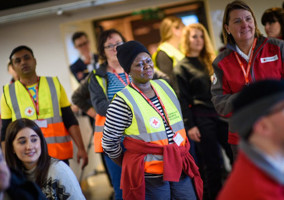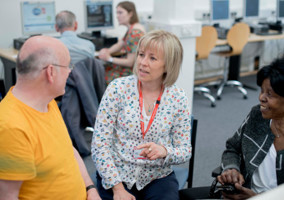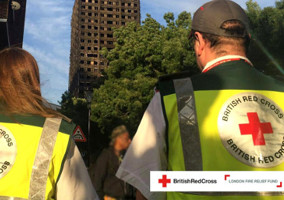The government should ensure that the expertise and role of the voluntary community sector is fully understood when responding to emergencies, the chief executive of British Red Cross has said.
Mike Adamson, who is due to leave the charity in a few months after nine years, was speaking on building resilient communities in the UK at the Conservative Party Conference.
Adamson said emergency response plans “must ensure that the expertise and role of the voluntary community sector at national and local level is fully understood”.
He said civil society should be “partners in the development of the plans around local resilience” and around how to identify vulnerable groups, “rather than simply being consulted two thirds, three quarters of the way through a process”.
Speaking at the same event, deputy prime minister Oliver Dowden said he was “determined that we do more, but we can only achieve it by working with organisations like the Red Cross and all those other voluntary and civic society organisations”.
Statutory bodies ‘did not have enough appreciation of the role that civil society organisations could play’
Adamson said the Grenfell Tower response in 2017 was a defining point for emergencies in the UK in that “new emergencies and overlapping emergencies became the new normal” and it “was the beginnings of what we would now call a whole society response”.
Moreover, the coronavirus pandemic “highlighted both the strengths of our response, but also our weaknesses, and perhaps our lack of preparedness in some key areas”.
He said: “It's imperative that we as a sector, as civil society organisations, with government and indeed the private sector start to think and respond differently. And our experience of the events in 2017 is that all too often, the response was highly siloed focusing on responding to one off events, using top down command approaches, with limited understanding of the communities, and how they were impacted.”
Adamson reflected: “The roles and responsibilities for coordinating response across national government and between national and local government was sometimes unclear. And sometimes statutory bodies didn't really also have enough appreciation of the role that civil society organisations could play in responding.
“And I think, to be honest, we have to own some of the responsibility for that as our sector, because we can look a bit confusing and diverse. And also, we'd not conveyed our ability to coordinate the work that we do, and also the professionalism that we can bring to it. But I think that's really what we've been really working very hard at since 2017.”
He highlighted the Voluntary Community Sector Emergency Partnership, an alliance of more than 250 mostly-local civil society organisations. It also includes government departments, and businesses in the community.
“It's really about us coming together to be better prepared for emergencies, and be an effective partner to government before, during and after.”
‘Expertise of voluntary community sector must be fully understood’
The British Red Cross CEO said: “We’d like to see three things. Firstly, the recognition that emergencies fall on people unequally. Therefore, there’s a need to plan for the impact of an emergency, as well as the response with pre existing inequalities and vulnerabilities in front of mind. And getting this right will really help the nation’s resilience.
“We’re all in the same storm, but we're actually in different boats. And actually, that is a profound insight into the way in which we think we should be thinking about the response in the future.”
Secondly, he said, “the plans must devolve more powers to local government to strengthen how both preparedness and response are coordinated and delivered to the local level”.
“We also need to think about the roles of central and local government,” he said.
“My personal reflection from particularly through Covid, and trying to work across central government during that time, the central government needs to focus on creating the frameworks for the response, but actually recognise that the actual response will be from local government and civil society organisations primarily.
“They’re the people who are there, and actually, the central government simply doesn't have the information in the centre to know what the situation is on the ground.
“And thirdly, plans must ensure that the expertise and role of the voluntary community sector at national and local level is fully understood. The voluntary community sector is well connected to communities and focuses on the human aspects of recovery that can otherwise be forgotten. And we are there before, during and after. And we’re very flexible in the way in which we work and capitalising on these strengths will strengthen the rapid deployment of resources in an emergency and strengthen our role in planning and preparedness.”
He said civil society should be “partners in the development of the plans around local resilience” and around how to identify vulnerable groups, “rather than simply being consulted two thirds, three quarters of the way through a process”.
Deputy PM: ‘Every major crisis requires collaboration between government and civil society’
Dowden said at the event: “It really struck me that the moment Covid really began to take off, the Red Cross were there, civic organisations were there, and voluntary organisations came together almost overnight, to help us through that crisis, whether it was at the very beginning where we're helping people that were sheltering from Covid, or through that fantastic effort that we saw during the rollout of the vaccine programme, which really gave us pride in what we can achieve together.
“What we really learned through Covid was, first of all, we have to have a whole of government approach. And we have to have a whole of society approach, bringing people together to address those challenges.
“Every major crisis requires collaboration between government, local resilience, civil society, business and individuals. That really is the golden thread that runs through all of our efforts to facilitate better coordination between all of these different groups.”
Dowden added: “We have made a lot of progress. I'm determined that we do more, but we can only achieve it by working with organisations like the Red Cross and all those other voluntary and civic society organisations.”
Related Articles













